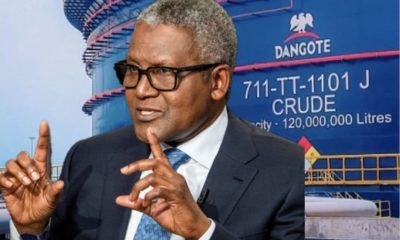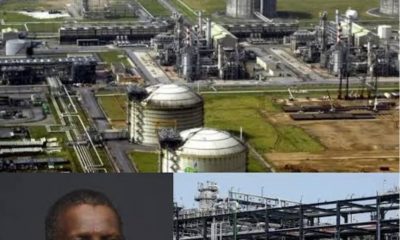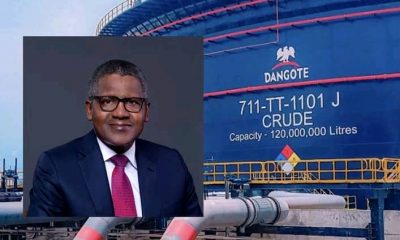Business
Effective stakeholders’ management key to business success-Dangote boss

Effective stakeholders’ management key to business success-Dangote boss
The Group Managing Director of Dangote Industries Limited, Olakunle Alake has hinged the success of business organizations on the adoption and implementation of effective stakeholders’ management strategies.
Speaking on ‘Stakeholder Management: The CEO’s Role’, at the Global CEO-Africa Programme, a collaboration by the Lagos Business school, IESE Business School, Barcelona, and Strathmore University, Nairobi on weekend Alake identified effective management of all stakeholders as a critical factor to achieving an organization’s aims on the global business landscape.
He urged CEOs who are determined to succeed to as a matter of urgency identify stakeholders who are critical to the success of the organization and start engaging them.
Alake listed these stakeholders to include: owners/investors, government officials, regulatory bodies, consumers, staff, distributors, and host communities.
The Dangote Group helmsman, while tasking the CEOs, said, “Put together a team to handle stakeholder relations; the team should include people with adequate international exposure and people with local exposure. Also, determine and know what the critical stakeholders want; and, more importantly, know what they do not want. Most importantly, you must be seen to align with local policies and the country’s aspirations. This builds a healthy relationship as well as provides a feedback mechanism. It also provides market intelligence. Also, constantly interact with your stakeholders,” he said.
He defined stakeholder management as the process of organizing, monitoring, managing, and improving relationships with people who have a vested interest in the business or organization. “Stakeholders have vested interest in the organizations as they depend on them to fulfill their personal goals. Staff depends on business organizations for their wages; suppliers for businesses and contracts; communities for life-changing projects, and government agencies for taxes and revenues”, he added.
Alake stated that an effective stakeholder management strategy helps develop and maintain relationships with all parties, mitigate risks, align business goals and eliminate delays. “Activities of stakeholders, whether as staff, government functionaries, tax authorities, regulatory bodies, customers, distributors or suppliers have a lot of impact on the organization.”
“Their activities can promote and sustain the organization. In the same manner, their activities can pull down the organization. For example, if an organization is having a running battle with the tax authorities, some sections of the media may pick the story that the organization is avoiding tax. Civil Society organizations may decide to picket the organization and cause a loss in customer base,” he said.
Explaining how the Dangote Group has been able to manage both internal and external stakeholders across Africa, Alake explained that the company consistently interfaces with stakeholders across diverse cultural backgrounds in all its areas of operation.
He disclosed that the company has operations in Congo, Ethiopia, Zambia, Tanzania, Cameroon, Senegal, South Africa, Ghana, and Sierra Leone. “Construction is ongoing in several other countries. We have adopted strategies to enable us to manage the diversity in regulation, labor, regulation, tax regime, and legal system across all our areas of operation”, he added.
He advised CEOs to expect diversity in regulations in their effort to manage stakeholders. “We have seen that stakeholders in different countries have expectations of what the Group should do or offer but the expectations differ from country to country. Hence, the approach to meeting expectations in each country is different and tailor-made for the country. We relate with stakeholders in the countries where we operate and try to meet their expectations.”
“For example, the expectations of a stakeholder in the Dangote Sugar fields of Numan differs from the expectation of a stakeholder in Dangote Cement, Ndola, Zambia. We have a multi-cultural workforce, with our staff drawn from all over the world. Our multicultural workforce
is our strength. The issue of employment is very sensitive. Some countries insist on locals and certain ratios for employment. We are sensitive to these issues and fast-track the development of locals to bridge the skills gap. In all, we have been able to effectively manage all our stakeholders in all our areas of operation.”
Speaking further, he explained: “As a conglomerate, we have drawn lessons from operating in countries and subject to different legal and social/cultural jurisdictions. We have had experiences where some Francophone countries insist on using paper bagging for cement products, while in some other countries, they allow for use of polymer bags.
“In several countries, there are weighbridges and additional cost for heavy trucks. Also, several countries insist on transporting a percentage of heavy cargo by rail, or penalties are incurred if this is breached. In Ethiopia, a cross-section of the stakeholders (youths) are insisting on ownership of mineral resources in their community and want companies to pay them for raw materials extracted. Also, land tenure system differs, with the government, traditional rulers and individuals in control in different countries.”
He, therefore, charged the CEOs to play the role of balancing all expectations/interests of the various stakeholders in other to achieve a win-win situation.
Alake concluded the discussion by commending the collaborative effort of the three great institutions for using the CEOs’ forum to bring together talents and experts who have firsthand experience of navigating through the continent’s business terrain to share their experience.
Business
Nigeria’s Inflation Drops to 15.10% as NBS Reports Deflationary Trend

Nigeria’s headline inflation rate declined to 15.10 per cent in January 2026, marking a significant drop from 27.61 per cent recorded in January 2025, according to the latest Consumer Price Index (CPI) report released by the National Bureau of Statistics.
The report also showed that month-on-month inflation recorded a deflationary trend of –2.88 per cent, representing a 3.42 percentage-point decrease compared to December 2025. Analysts say the development signals easing price pressures across key sectors of the economy.
Food inflation stood at 8.89 per cent year-on-year, down from 29.63 per cent in January 2025. On a month-on-month basis, food prices declined by 6.02 per cent, reflecting lower costs in several staple commodities.
The data suggests a sustained downward trajectory in inflation over the past 12 months, pointing to improving macroeconomic stability.
The administration of President Bola Ahmed Tinubu has consistently attributed recent economic adjustments to ongoing fiscal and monetary reforms aimed at stabilising prices, boosting agricultural output, and strengthening domestic supply chains.
Economic analysts note that while the latest figures indicate progress, sustaining the downward trend will depend on continued policy discipline, exchange rate stability, and improvements in food production and distribution.
The January report provides one of the clearest indications yet that inflationary pressures, which surged in early 2025, may be moderating.
Bank
Alpha Morgan to Host 19th Economic Review Webinar

Alpha Morgan to Host 19th Economic Review Webinar
In an economy shaped by constant shifts, the edge often belongs to those with the right information.
On Wednesday, February 25, 2026, Alpha Morgan Bank will host the 19th edition of its Economic Review Webinar, a high-level thought leadership session designed to equip businesses, investors, and individuals with timely financial and economic insight.
The session, which will hold live on Zoom at 10:00am WAT and will feature economist Bismarck Rewane, who will examine the key signals influencing Nigeria’s economic direction in 2026, including policy trends, market movements, and global developments shaping the local landscape.
With a consistent track record of delivering clarity in uncertain times, the Alpha Morgan Economic Review continues to provide practical context for decision-making in a dynamic environment.
Registration for the 19th Alpha Morgan Economic Review is free and can be completed via https://bit.ly/registeramerseries19
It is a bi-monthly platform that is open to the public and is held virtually.
Visit www.alphamorganbank to know more.
Business
GTBank Launches Quick Airtime Loan at 2.95%

GTBank Launches Quick Airtime Loan at 2.95%
Guaranty Trust Bank Ltd (GTBank), the flagship banking franchise of GTCO Plc, Africa’s leading financial services group, today announced the launch of Quick Airtime Loan, an innovative digital solution that gives customers instant access to airtime when they run out of call credit and have limited funds in their bank accounts, ensuring customers can stay connected when it matters most.
In today’s always-on world, running out of airtime is more than a minor inconvenience. It can mean missed opportunities, disrupted plans, and lost connections, often at the very moment when funds are tight, and options are limited. Quick Airtime Loan was created to solve this problem, offering customers instant access to airtime on credit, directly from their bank. With Quick Airtime Loan, eligible GTBank customers can access from ₦100 and up to ₦10,000 by dialing *737*90#. Available across all major mobile networks in Nigeria, the service will soon expand to include data loans, further strengthening its proposition as a reliable on-demand platform.
For years, the airtime credit market has been dominated by Telcos, where charges for this service are at 15%. GTBank is now changing the narrative by offering a customer-centric, bank-led digital alternative priced at 2.95%. Built on transparency, convenience and affordability, Quick Airtime Loan has the potential to broaden access to airtime, deliver meaningful cost savings for millions of Nigerians, and redefine how financial services show up in everyday life, not just in banking moments.
Commenting on the product launch, Miriam Olusanya, Managing Director of Guaranty Trust Bank Ltd, said: “Quick Airtime Loan reflects GTBank’s continued focus on delivering digital solutions that are relevant, accessible, and built around real customer needs. The solution underscores the power of a connected financial ecosystem, combining GTBank’s digital reach and lending expertise with the capabilities of HabariPay to deliver a smooth, end-to-end experience. By leveraging unique strengths across the Group, we are able to accelerate innovation, strengthen execution, and deliver a more integrated customer experience across all our service channels.”
Importantly, Quick Airtime Loan highlights GTCO’s evolution as a fully diversified financial services group. Leveraging HabariPay’s Squad, the solution reinforces the Group’s ecosystem proposition by bringing together banking, payment technology, and digital channels to deliver intuitive, one-stop experiences for customers.
With this new product launch, Guaranty Trust Bank is extending its legacy of pioneering digital-first solutions that have redefined customer access to financial services across the industry, building on the proven strength of its widely adopted QuickCredit offering and the convenience of the Bank’s iconic *737# USSD Banking platform.
About Guaranty Trust Bank
Guaranty Trust Bank (GTBank) is the flagship banking franchise of GTCO Plc, a leading financial services group with a strong presence across Africa and the United Kingdom. The Bank is widely recognized for its leadership in digital banking, customer experience, and innovative financial solutions that deliver value to individuals, businesses, and communities.
About HabariPay
HabariPay is the payments fintech subsidiary of GTCO Plc, focused on enabling fast, secure, and accessible digital payments for individuals and businesses. By integrating payments and digital technology, HabariPay supports innovative services that make everyday financial interactions simpler and more seamless.
Enquiries:
GTCO
Group Corporate Communication
[email protected]
+234-1-2715227
www.gtcoplc.com
-

 celebrity radar - gossips6 months ago
celebrity radar - gossips6 months agoWhy Babangida’s Hilltop Home Became Nigeria’s Political “Mecca”
-

 society6 months ago
society6 months agoPower is a Loan, Not a Possession: The Sacred Duty of Planting People
-

 society5 months ago
society5 months agoReligion: Africa’s Oldest Weapon of Enslavement and the Forgotten Truth
-

 news6 months ago
news6 months agoTHE APPOINTMENT OF WASIU AYINDE BY THE FEDERAL GOVERNMENT AS AN AMBASSADOR SOUNDS EMBARRASSING









